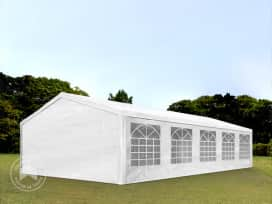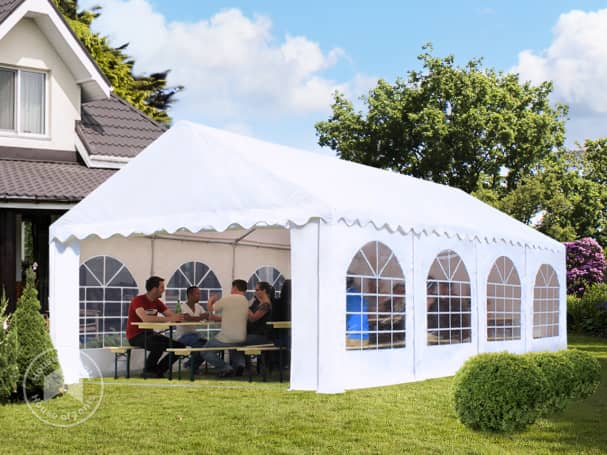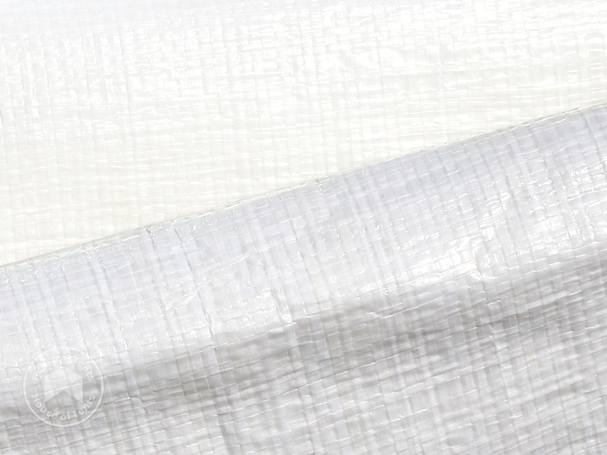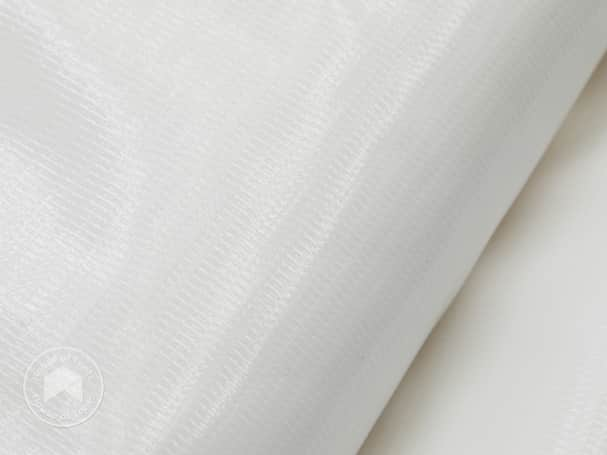
- Standard click frame
- PE 350 tarpaulin, white
PE (polyethylene) and PVC (polyvinyl chloride), it must be said, are not the most catchy names for materials. For many people, these acronyms won't mean anything at all. In fact, they're both fantastic materials for forming the roof and walls of marquees and other heavy duty structures, but you wouldn't guess that from the name alone.
These
are the most commonly used fabrics for making marquees, and the only
material we use for our marquees and storage tents. Both PVC and PE can
be produced in different colours, and can also be made completely
transparent to produce effective windows. In this guide, we give you an
overview of the advantages of each tarpaulin type.

PE is the abbreviation and short form for polyethylene. Tarpaulins made of this fabric are lightweight, yet robust. Marquees with PE tarpaulins – often called poly tarps – are particularly suitable for occasional users who prefer easy handling to high robustness.
PE party tents are lighter than tents with PVC tarpaulins. This facilitates both handling during assembly and transport of the pavilion - because the total weight and the packing volume are lower with PE tarps. In addition, garden marquees with poly tarps are cheaper on average than similar PVC marquees, but still offer good protection against rain and wind with a high quality of workmanship.

Our tents with standard PE tarpaulin come in a large variety of sizes and are available in three models: FLEX Light, FLEX Smart and FLEX Plus. All products are 100% waterproof, UV-resistant and stable. Polyethylene tarps have a tearing strength of 350 - 550 N, depending on the variant. The tearing strength is determined in a stretch test using a 5 cm wide strip sample of the tarpaulin, according to the standard "DIN EN ISO 13934-1".
All seams are welded as standard using a high-temperature process and thus offer maximum protection against moisture penetration via the seams. The tarpaulins differ in their thickness, but all offer a high degree of cover from rain.
would like to buy an inexpensive marquee.
are looking for a waterproof tent with high UV resistance.
only want to use the structure occasionally, for a day or two at a time.
need a light tarpaulin that is easier to handle and erect.
would like to keep the packed size of the tarp as low as possible, for instance, while camping.
Heavy duty PVC tarpaulins are similar in feel to lorry trailer covers. They are characterised by their high durability and robustness. Marquees with PVC tarpaulins therefore offer a high level of weather protection, are winter-proof and particularly resistant to environmental influences. That means they're also suitable for longer-term set-ups up to year-round use.

You will find our PVC marquees in the qualities PRO Light,
PRO Smart and PRO Plus. Depending on the model,
the tarpaulin has a tearing strength of 700 - 1400 N, thanks in part to
an inner mesh fabric that significantly strengthens the tarp. These
heavy duty tarpaulins are 100% weatherproof, UV-resistant, tear-proof
and highly stable. As with PE products, all seams are welded using a high-temperature process
and are therefore 100% waterproof - even in the event of waterlogging.
In addition to our conventional PVC marquees, fire-safe certified
marquees with super heavy weight tarpaulin roofs and sidewalls are also
available.
would like to set up a heavy duty marquee for a longer period of time or all year round.
are looking for a durable party tent with a waterproof tarpaulin and protection against UV rays.
are looking for a high quality marquee with a tarpaulin that has the feel of a truck tarp.
want to set up heaters or other sources of heat in or near the marquee.
want to allow smoking under cover.
Polyethylene (PE for short, also known as polyethene) is the most commonly produced plastic in the world. It is very versatile and is used for buckets, plastic bags, freezer bags, bottle crates, baskets and dustbins - as well as for tents. Pipes and cable insulation are also made of PE. Polyethylene belongs to the plastic family of thermoplastics (plastic = malleable), which become softer and softer the more they are heated. In contact with chemicals, however, PE is very resistant: The material is resistant to salt solutions, alkalis and inorganic acids. Polyethylene is obtained through the polymerisation of ethene, a gaseous substance produced by the petrochemical processing of crude oil. Essentially, a distinction is made between two types of PE: The stretchable PE-LD (LD = Low Density), which is used to make plastic bags and films, for example, and the more stable PE-HD (HD = High Density), which is used to make pipes, among other things.

Polyvinyl chloride (PVC for short) is used in large quantities in a wide variety of areas. The elasticity of PVC can be varied very well by adding different substances during the manufacturing process. This is why it is used on the one hand in a hard form (rigid PVC, an amorphous thermoplastic) for products such as gutters, pipes, records and shell cases, and on the other hand for flooring or garden hoses (soft PVC - an elastic, rubber-like thermoplastic produced by adding plasticisers).
In its soft form, PVC is so flexible that it can even be used to laminate goods. It is applied as a PVC "coating" to wellington boots and the covers of upholstered furniture. It is also used as a coating on our polyester pop up gazebos. In addition, the heavy duty material resists alcohols, bases, fats, acids and oils.

Both fabrics are easy to clean. For particularly stubborn dirt and mildew, our cleaning detergent
specifically designed for PE and PVC fabrics is the most effective
product to use. If eyelets or sections of the canopy roof need to be
repaired, you can read all about that in our article concerning the repair of PE and PVC fabrics. By the way: Eyelet repair kits
are also available in our online shop in the accessories category - as
well as side walls, gable walls with windows, bungee straps, bag sets
and heavy duty anchors for the galvanised metal poles and the ground
bar. You can find our full range of accessories, or order replacement
parts on our accessories and spare parts page.
Both PE and PVC fabric tarps offer a high degree of protection against rain and sun. While both tarps can stand up to the cold, including sub-zero temperatures, we recommend heavy duty PVC for use over the winter due to its strength in case of the accumulation of snow on the roof of your structure.
Poly tarps come with a lower price tag and are lightweight. They are convenient to handle and are more suitable for occasional use for a few days due to the thickness and texture of the tarp.
PVC, on the other hand, is a heavy, robust tarpaulin material that can withstand the effects of weather for longer periods of time. Heavy duty PVC tarpaulins are therefore suitable for long-term to year-round use and even resemble a truck tarp in terms of feel.
Expert advice
